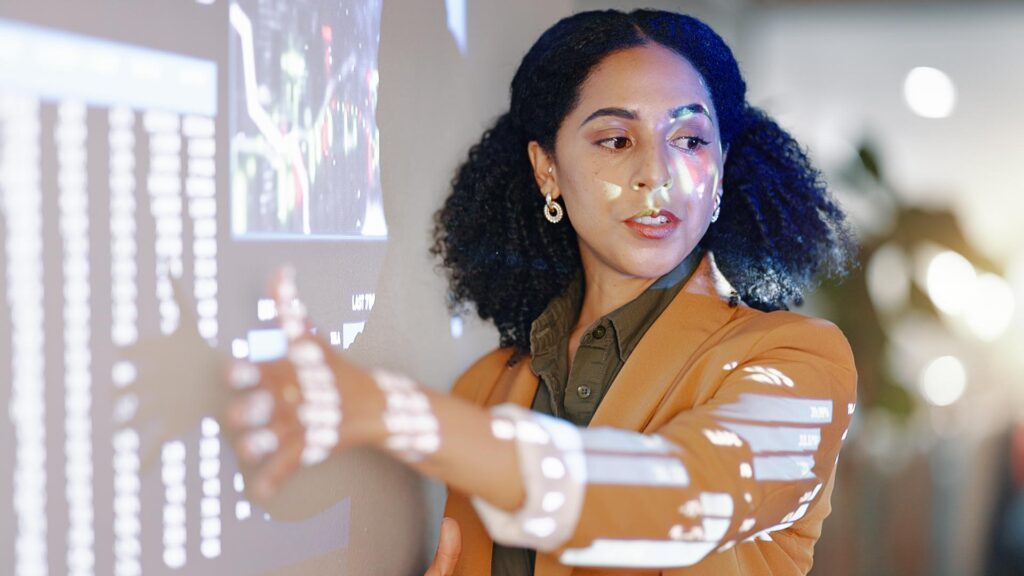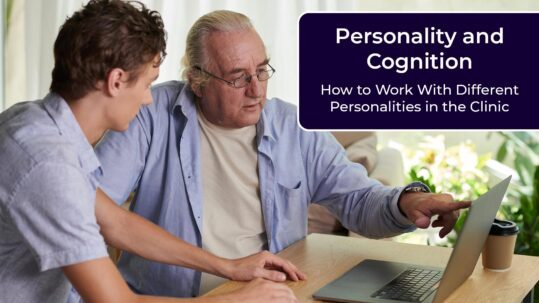AI in Rehabilitation and Clinical Practice
Ferris Bueller once said, “Life moves pretty fast. If you don’t stop and look around once in a while, you could miss it.“ In today’s high-tech world, the integration of new technology into our day to day lives is moving very fast. One could argue that if you don’t quickly learn and adapt to new tech, this new way of life can be moving on without you…fast. So in our world of artificial intelligence and healthcare, how do we educate, change and adapt before the train pulls out of the station without us?
Artificial intelligence (AI) is reshaping nearly every field of healthcare, and the world of rehabilitation is no exception. From clinical documentation to daily treatment planning, AI has the potential to support clinicians in delivering more effective, efficient, and personalized care. However, at its core, rehabilitation is deeply human: it’s about connection, empathy, and understanding the lived experience of recovery. It’s about helping those experiencing injury or disability complete meaningful tasks in their daily lives and improving quality of life. So, where does AI fit in?

What Is AI in Clinical Contexts?
In healthcare, artificial intelligence refers to systems and algorithms that can analyze data, identify patterns, and support decision-making. These tools might use machine learning, natural language processing, or predictive analytics to support tasks that traditionally relied on human interpretation. To the average healthcare worker, this might sound like a whole other language. So let’s explore what these tools are and how they can help us.
How can we leverage AI systems to assist in rehabilitative clinical care?
- Streamline administrative tasks like documentation and scheduling
- Help clinicians track progress through automated performance analysis
Personalize therapy plans by identifying which interventions are most effective for specific patient populations (diagnosis, age, areas of deficit, etc.) - Provide virtual coaching or training between sessions
Change typically receives heavy pushback, especially when it involves abstract ideas and processes. However, AI cannot replace the human experience, task analysis, treatment planning, or creativity in rehabilitation. Rather than replacing clinicians, these tools act as intelligent supports—allowing professionals to focus more on the “care” in “healthcare,” and less on time-consuming manual processes. If parts of the rehab puzzle can be automated to take some manual work off providers, AI can be a big help.
AI is already extending across various healthcare professionals and creating a big impact for patients. Below are a few examples of current practices being put into place. While these may be constantly changing and updating over time, they are a starting point on how AI is already being put into play within rehabilitation.
Occupational Therapy: Smart sensors and adaptive cognitive tools can help evaluate and support daily living skills.
Speech and Language Therapy: AI-driven speech recognition tools can assist in assessing fluency, articulation, and language processing.
Physical Therapy: Motion-tracking software and wearable sensors can analyze movement patterns and guide exercise form.
Neuropsychology: AI-based assessments can quickly identify cognitive strengths and weaknesses, helping clinicians target interventions more precisely.
The Role of AI in Cognitive Rehabilitation
Leaning into tech-based programs and features can facilitate high-quality cognitive rehabilitation. Platforms like HappyNeuron Pro integrate adaptive algorithms that adjust difficulty levels in real-time, helping clients work within their “just-right challenge.” This ensures that each task remains engaging and appropriately difficult, but not overwhelming. This is a crucial aspect of tapping into neuroplasticity.
AI also allows for:
- Data-driven insights: Clinicians can view objective progress information and adapt therapy strategies, intensity, or areas of focus, accordingly.
- Remote engagement: Clients can complete digital home programs at their convenience, while the clinician monitors results through AI-generated performance summaries.
- Expanded accessibility: AI-based tools can support telehealth or hybrid care models, extending therapy care beyond clinical walls.
Ethical and Practical Considerations
Practitioners should always use new healthcare technologies and tools responsibly and ethically. Clinicians should remain mindful of data privacy and security in digital platforms by handling patient information with care, monitoring access to information, and maintaining HIPPA. They also should maintain equitable access to technology for all clients. Most importantly, sustaining clinical judgement and use of professional skills for the wants and needs of their clients. It is important that AI tools serve to complement treatment, but by no means do they dictate treatment decision-making.
AI should never (and will never) replace empathy, “therapeutic use of self,” or professional expertise and experience. Instead, it should free up time and energy for clinicians to spend more with their clients, for more intentional and meaningful care.
The Future of AI in Rehab
As technology becomes more and more integrated into our everyday lives, it will also continue to evolve within healthcare and clinical settings. We may start to see:
- Predictive analytics increase to anticipate patient outcomes and progress progression
- Virtual co-therapists that provide real-time feedback during home exercise programs
- Personalized rehabilitation plans informed by ongoing digital data collection
The point to remember is that rehabilitation is not robotic, and never will be. However, AI can assist in making rehabilitative programs and practices work smarter, become more accessible and adaptable, and more client-centered over time.
How HappyNeuron Pro Uses Technology to Support Clinicians
HappyNeuron Pro incorporates tech-driven adaptability and modifications to personalize the cognitive training experience for each client. The platform’s exercises adjust automatically based on performance. This helps maintain optimal therapeutic challenge and interest.
Providers are also able to:
- View detailed progress analytics to guide session planning
- Assign customized home exercise programs (HEPs) that continue between visits
- Track client progress in real time, identifying strengths and areas needing support
By combining each clinician’s professional knowledge, experience and creativity with HappyNeuron Pro’s intelligent design, clients are able to foster more efficient and meaningful rehabilitation outcomes. Our algorithms help adapt challenge levels within exercises and track progress. However, we are always looking for ways that we can update our programs to ease access and participation within cognitive rehabilitation and remediation.
Conclusion
Learning how to make new technologies your friend, not your foe, can help your practice stay highly functional and relevant. When used thoughtfully, AI tools can reinforce patient interest and home programming buy-in, optimize clinical outcomes, and ease the manual task-load on clinicians. Whether you’re technology-resistant, on the fence, or ready to dive in, it’s easy to see how AI-informed applications can open new doors for more dynamic, evidence-based care.
Interested in exploring tech-driven cognitive rehabilitation?
Schedule a demo or sign up for a free trial to see how HappyNeuron Pro can strengthen your clinical toolbox.
References:
Alshami, A. Nashwan, A. AlDardour, A. Qusini. Artificial Intelligence in rehabilitation: A narrative review on advancing patient care. Rehabilitación, Volume 59, Issue 2, 2025, 100911,ISSN 0048-7120, https://doi.org/10.1016/j.rh.2025.100911. (https://www.sciencedirect.com/science/article/pii/S0048712025000313)
James T. Foster, Amy Lindner, Bethany Paulding, Allison Mills, Leyla T. Vazquez; Artificial Intelligence in Clinical OT: A Survey of Current & Future Anticipated Applications. Am J Occup Ther August 2025, Vol. 79(Supplement_2), 7911500086p1. doi: https://doi.org/10.5014/ajot.2025.79S2-PO82
Khalid UB, Naeem M, Stasolla F, Syed MH, Abbas M, Coronato A. Impact of AI-Powered Solutions in Rehabilitation Process: Recent Improvements and Future Trends. Int J Gen Med. 2024 Mar 12;17:943-969. doi: 10.2147/IJGM.S453903. PMID: 38495919; PMCID: PMC10944308.
Lanotte F, O’Brien MK, Jayaraman A. AI in Rehabilitation Medicine: Opportunities and Challenges. Ann Rehabil Med. 2023 Dec;47(6):444-458. doi: 10.5535/arm.23131. Epub 2023 Dec 14. PMID: 38093518; PMCID: PMC10767220.
MohammadNamdar M, Lowery Wilson M, Murtonen K, Aartolahti E, Oduor M, Korniloff K. How AI-Based Digital Rehabilitation Improves End-User Adherence: Rapid Review.JMIR Rehabil Assist Technol 2025;12:e69763.URL: https://rehab.jmir.org/2025/1/e69763.DOI: 10.2196/69763
https://www.physio-pedia.com/Artificial_Intelligence_(AI)_In_Health_Care_and_Rehabilitation









